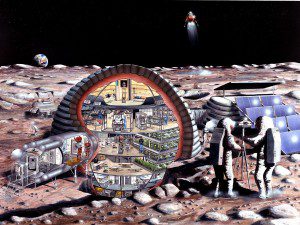Do rocks on the Moon and Mars have inherent rights? And what about Aliens, who aren’t human, and their livestock and pets? If not, can Earthlings own them, especially if there are no property laws on those planets?
Some might consider these questions and issues far-fetched, but they are only as far-fetched as the aspirations of corporations and individuals considering claims to privatizing domains in outer space (They also reflect what has happened over generations on this planet). Take for example this article in Wired: “Loophole Could Allow Private Land Claims on Other Worlds.” Private parties are looking for a loophole in the 1967 Outer Space Treaty, which does not allow a nation to claim sovereign rights to a body in outer space. Nations might not be able to do so, but what about companies and wealthy individuals? Depending on the answer, nations like the U.S. might remove their support and withdraw from the treaty to sanction property rights to private interests. Such potential moves depend in part on whether or not they think the potential gains to their economies outweigh the backlash from the global community.
A question arises at this point concerning the drive to colonize and privatize. Why must we seek to colonize—including privatize—swaths of land, including nations and continents, as property? Moreover, what is the impact of such moves, especially for those without sufficient resources to purchase land and pay for legal representation that pertains to Western-based property laws? Think about Hawaii’s beaches, which are public domain, but may now be up for wealthy people’s grabs (See my post: “Is It Okay to Privatize Public Beaches?”). Private property laws were introduced to Hawaii and assisted in eroding native Hawaiian sovereignty (See “Hawaii Land and Property”). Or consider the Columbia River Gorge, where First Nations people lost out to having rights and sufficient access to water as a result of not owning land because of the “Doctrine of Discovery” and its outworking in laws across the country (See my post: “Access to Clean Water: Clearly There’s No Debate, Right?”). Is it all bound up with humanity’s, especially Euro-American, aspirations involving Manifest Destiny?
Empire building by nations and empires, as well as corporations and individuals, have often reflected the quest for divinization. After all, ownership is a claim to sovereignty at various levels. One might even ask: in addition to cattle, does God own the rocks on a thousand hills on Earth—or Mars—or do we?
Immanuel Kant argued that the idea of God’s transcendent existence, the soul’s immortality and divine judgment functioned as regulating ideals for ethics. Given that monotheistic notions of God have been displaced in many sectors of our culture, have we replaced traditional transcendental frameworks that regulate morality with humanized versions, including space exploration? Does space exploration function as secularized divinity, including attempts at privatization involving ownership? After all, privatization and ownership are signs of sovereignty. If such notions of human sovereignty replace the divine sovereign, perhaps wealth as savings or access to long lines of credit replace traditional notions of immortality, and courts of law overseeing cases of property rights replace the divine judgment, especially when transcendence and immortality are not framed in terms of the supra-sensible, but the extra-sensible, as in the extraterrestrial domain.
Building on this point, if economic value regulates and shapes ethics, must we privatize everything to safeguard value and virtue, such as altruism? If altruism is ultimately a commodity, as with other ‘things’ in a free market society, is altruism depleted (and devalued?) with use, as many free-market theorists argue, or expanded with use, as Aristotle, Rousseau and Michael Sandel have argued? (See the review of Michael J. Sandel’s What Money Can’t Buy: The Moral Limits of Markets at TheHumanist.com by Peter C. Grosvenor).
Perhaps from a free market ideological vantage point, one might even argue that life on other planets needs to be privatized to maintain value. If life itself is a commodity, alien forms of life might even be bought and sold, as in the case of life here on Earth past and present, to ‘protect’ their value. It is an easy move to make, especially if we value others as having less value based on less income and rational capacities, as well as different skin colorations, customs, and the like. Even Kant’s attempt to provide universal grounds for ethics appears to fall short of safeguarding universal human value in that he appeared to see only European men as being rational and moral ends in themselves, and not mere means (On Kant and racism, see the chapter dedicated to his work titled “Kant and Race” by Thomas E. Hill, Jr. and Bernard Boxill, in Race and Racism, edited by Bernard Boxill, Oxford Readings in Philosophy series {Oxford University Press, 2001), chapter 18.).
Even though ‘civilized’ countries no longer promote slavery, but outlaw it (at least officially), it is important that we treat all humans as more than means to ends, regardless of their presumed ability to rationalize and provide moral grounds for life. While reason should play a role in moral valuations, what is needed is a more expansive view of human value, including how reason is expressed in various cultures. The same goes for economic evaluations. We must not ultimately value people based on their rational or economic capacities.
Looking beyond planet Earth, what about alien forms of intelligent life, as well as animal rights, and the like, on other planets? Even if human life should not be privatized, should all other life and places where life is found be privatized? What are the limits, if any? Who has the right to determine what constitutes life and the right to life, including freedom and ownership on this or any planet? Where do we go from here, as we head out into space?
I close with a quotation from C. S. Lewis’ Out of the Silent Planet, where the antagonist Weston, a colonialist expansionist from Earth, is addressing the ruler of Mars:
“It is in her right,” said Weston, “the right, or, if you will, the might of Life herself, that I am prepared without flinching to plant the flag of man on the soil of Malacandra: to march on, step by step, superseding, where necessary, the lower forms of life that we find, claiming planet after planet, system after system, till our posterity—whatever strange form and yet unguessed mentality they have assumed—dwell in the universe wherever the universe is habitable.” (C. S. Lewis, Out of the Silent Planet (New York: Macmillan Publishing Company, Inc., 1965), page 137.














